News
MEG reunites in Vienna for the European Geosciences Union General Assembly
April–May 2025
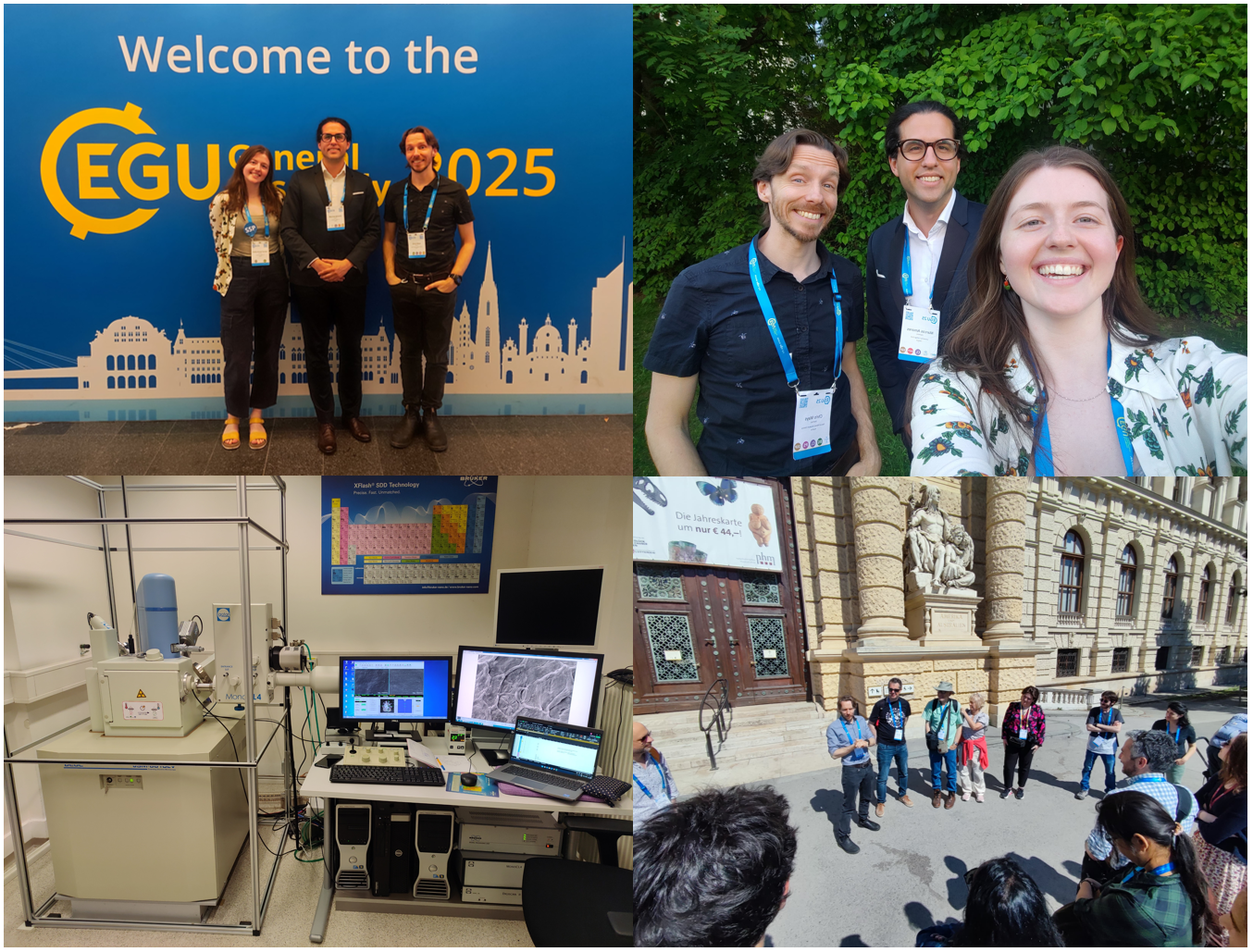 Holly-Anne and Marcos visited Chris in Vienna to explore the Natural History Museum Vienna (NHMW) and to present the Mass Extinction Group’s latest research at the EGU general assembly. All three of the group’s talks at this conference of over 20,000 attendees were presented and received well, and the massive variety of other talks on topics from climate change to geology and palaeontology were extremely thought-provoking! Chris also led tours of EGU attendees around NHMW, whilst Holly-Anne took images of Triassic fossil leaves collected from the Sydney Basin using Scanning Electron Microscopy, and Marcos diligently worked on his next paper. When they weren’t exploring the museum fossil collections and planning future scientific endeavors together, MEG were discovering the amazing architecture, art and delicious food of Vienna!
Holly-Anne and Marcos visited Chris in Vienna to explore the Natural History Museum Vienna (NHMW) and to present the Mass Extinction Group’s latest research at the EGU general assembly. All three of the group’s talks at this conference of over 20,000 attendees were presented and received well, and the massive variety of other talks on topics from climate change to geology and palaeontology were extremely thought-provoking! Chris also led tours of EGU attendees around NHMW, whilst Holly-Anne took images of Triassic fossil leaves collected from the Sydney Basin using Scanning Electron Microscopy, and Marcos diligently worked on his next paper. When they weren’t exploring the museum fossil collections and planning future scientific endeavors together, MEG were discovering the amazing architecture, art and delicious food of Vienna!
https://meetingorganizer.copernicus.org/EGU25/EGU25-6742.html
https://meetingorganizer.copernicus.org/EGU25/EGU25-1062.html
https://meetingorganizer.copernicus.org/EGU25/EGU25-488.html
Marcos presents geochemical findings at EGU25
May 2025
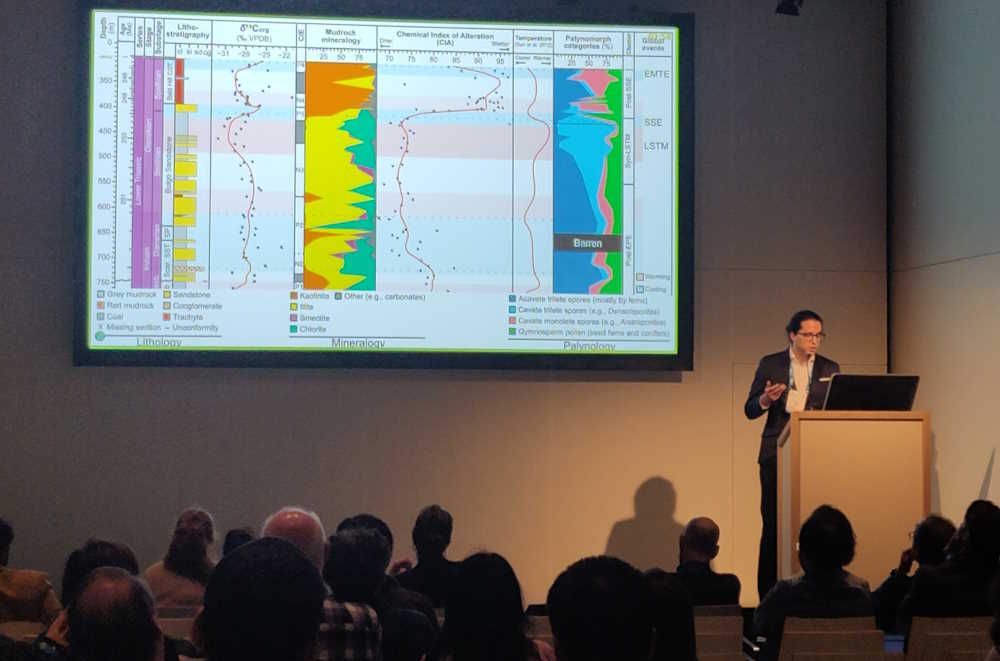
Marcos had the opportunity to present exciting new geochemical findings in the general assembly of the European Geoscientists Union (EGU), the largest of its kind in Europe. These early findings are a continuation of his research on a southern polar locality and how it recovered from Earth's largest mass extinction ~252 million years ago.
Chris interviewed by Austrian State Media about Early Triassic recovery floras
April 2025
1-948x533.png)
Chris was interviewed for Mayr's Magazin (published by the Austrian public broadcast station, ORF) about the study led by Marcos Amores published in GSA Bulletin. Chris presents the case for the the long-term impacts of extreme warming on land ecosystems, and draws parallels and contrasts between the end-Permian event (252 million years ago) with modern warming.
You can view the original episode here: Mayr's Magazin. (Note: the interview is presented in German; Chris' section starts at 6:57 mins.)
Marcos' publication reveals ancient plants' long road to ecosystem recovery after a mass extinction
March 2025
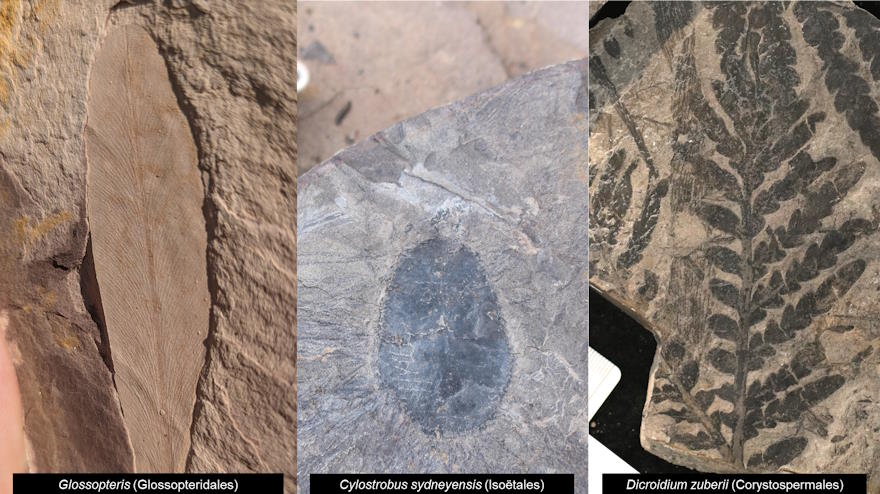
A new study published in GSA Bulletin reveals how south polar plants took millions of years to recover after the End-Permian mass extinction, Earth’s most severe climate catastrophe (252 million years ago).
Researchers from University College Cork, the University of Connecticut, and the Natural History Museum of Vienna found that conifers initially survived but collapsed during extreme warming lasting 800,000 thousand years. Hardy clubmoss-like plants took over until a cooling event called the Smithian-Spathian Event allowed unusual gymnosperms called seed ferns to reestablish stable forests once again.
Lead author and fellow MEG member Marcos Amores emphasizes the study’s relevance today, warning that disruptions to ecosystems can have long-lasting effects on climate and biodiversity.
You can read more about the research in our piece for The Conversation.
Dr Chris Mays becomes lead scientist on fossil plants at the Natural History Museum of Vienna
September 2024
.jpg)
Chris has taken up the role of Senior Curator of Fossil Plants at the Natural History Museum of Vienna, Austria. In Vienna, Chris will continue his mission of understanding the causes and effects of the worst times in Earth's history, in collaboration with the rest of the Mass Extinction Group in Cork.
But don’t worry: The Mass Extinction Group is not extinct! Chris retains the role of Adjunct Lecturer at University College Cork, and leader of MEG.
You can read more about his new role here.
To learn more about Chris' ongoing research at University College Cork, click here.
Fossils for our Future Finale
September 2024
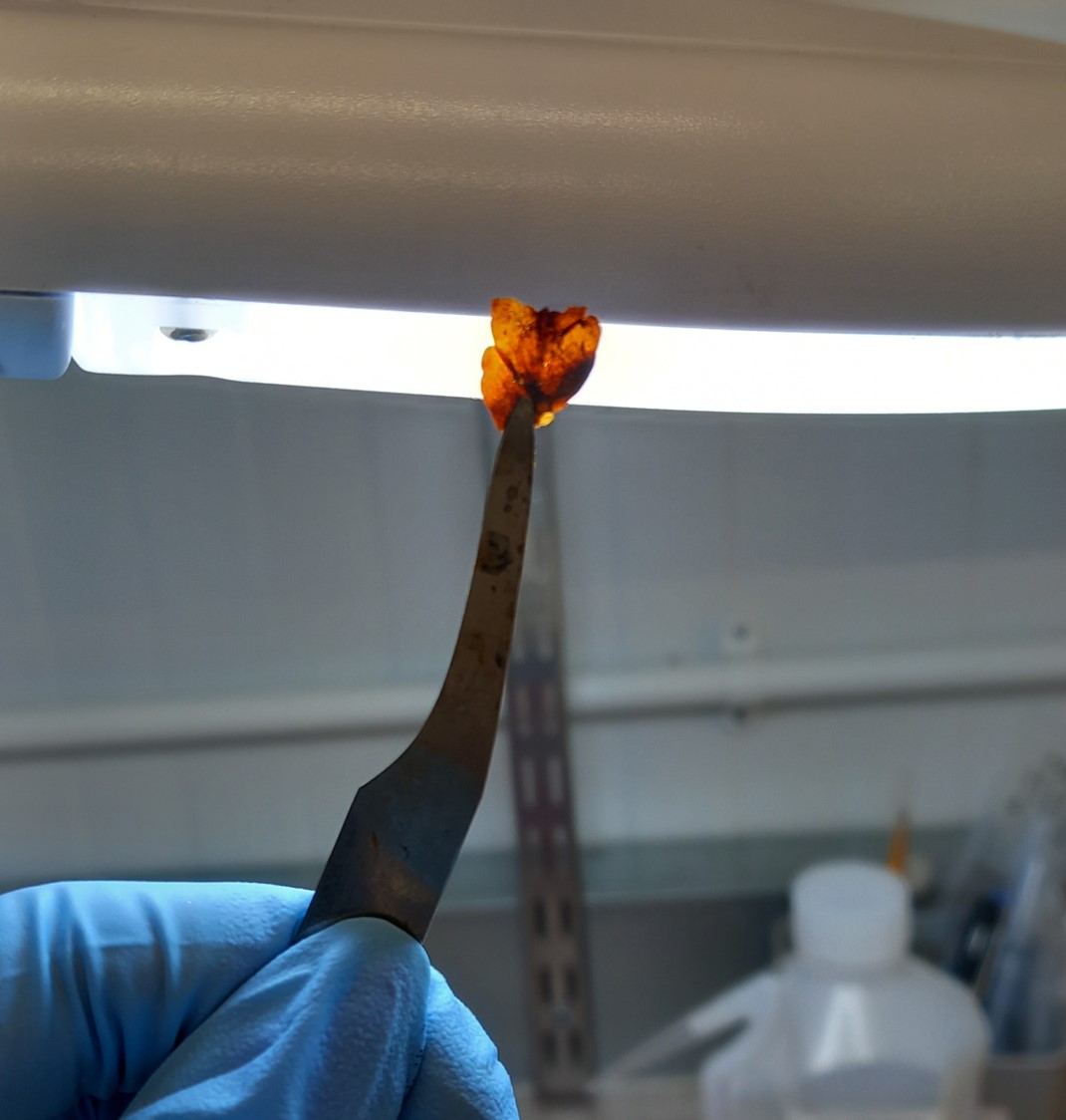
The Fossils for our Future programme has come to a close. With over 1,000 hours logged and over 3,600 specimens prepared, the programme is grateful to the passionate work and dedication of its volunteers. It's not over yet for these palaeobotanical fossils though! Researchers in the MEG group have already begun work on the next steps.
Stay tuned for updates on this page as we strive to use the knowledge we gain from these ancient plants to create a more informed future for us all.
Hunting in southern Ireland for one of the world’s oldest mass extinctions
September 2024
1.jpg) Holly-Anne, Marcos and Chris conducted an expedition to find the fossils and rocks from a lesser known mass extinction: the end-Devonian extinction event (~359 million years ago). They teamed up with collaborators from Trinity College Dublin (Dr Carla Harper, Mr Thibault Durieux), and the Centre National de la Recherche Scientifique, France (CRNS; Dr Anne-Laure Decombeix, Ms Gaëlle Viennois). Together, they explored outcrops of southern Ireland (e.g., Hook Peninsula; left) that show how some of the earliest trees on Earth were cut down to size by an extreme and rapid climate change.
Holly-Anne, Marcos and Chris conducted an expedition to find the fossils and rocks from a lesser known mass extinction: the end-Devonian extinction event (~359 million years ago). They teamed up with collaborators from Trinity College Dublin (Dr Carla Harper, Mr Thibault Durieux), and the Centre National de la Recherche Scientifique, France (CRNS; Dr Anne-Laure Decombeix, Ms Gaëlle Viennois). Together, they explored outcrops of southern Ireland (e.g., Hook Peninsula; left) that show how some of the earliest trees on Earth were cut down to size by an extreme and rapid climate change.
Holly-Anne's publication investigates plant–insect interactions as indicators of Triassic mass extinction ecosystem recovery
September 2024
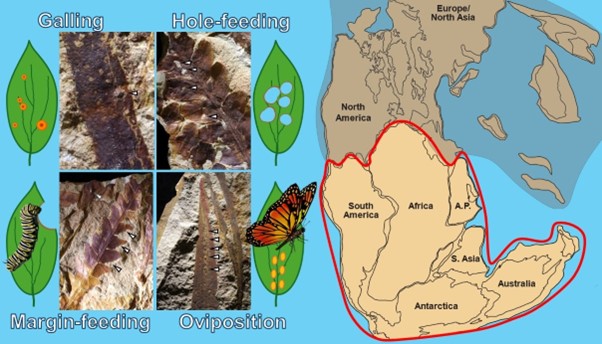
Plant fossils are extremely useful in inferring the presence and behaviour of insects, when remains of the insects themselves are not present. In their newest paper, Holly-Anne and her supervisors, Steve and Chris, collected every record of damage caused by insects in the Southern Hemisphere on Triassic plant fossils. They discovered evidence of insects living, feeding and reproducing on plants after the end-Permian extinction event, with four examples illustrated here: Galling, hole-feeding, margin feeding, and oviposition (egg-laying). This evidence of plant-insect interaction suggests that the ecosystems were already recovering a few million years after the world’s worst mass extinction!
Click here to read the publication. Click here to see the ResearchGate version.
doi: 10.3389/fevo.2024.1419254 Click here to find out more about MEG Research.
Click here to learn more about Prof. Steve McLoughlin's work.
Click here for social media coverage or here.
Grant awarded to Dr Chris Mays to explore Ireland’s mass extinctions
August 2024
1.jpg)
Chris has been awarded a ‘Frontiers of the Future’ grant from Research Ireland (formerly Science Foundation Ireland) to piece together two mass extinction events from the fossil and rock records of Ireland. Chris’ project is called ‘DEEPER: Ireland's DEEP-time Extinction and Recovery Project’. The outcrops and rock cores (left) of Ireland preserve at least two major mass extinctions that were triggered by rapid and extreme warming. Chris’ team will read their chemical and fossil signatures, like this 360-million-year-old fossil plant spore (right), to discover how and when these happened. From these, we can make predictions about our long-term future in a rapidly warming world.
Fossils for our Future welcomes Summer cohort
July 2024
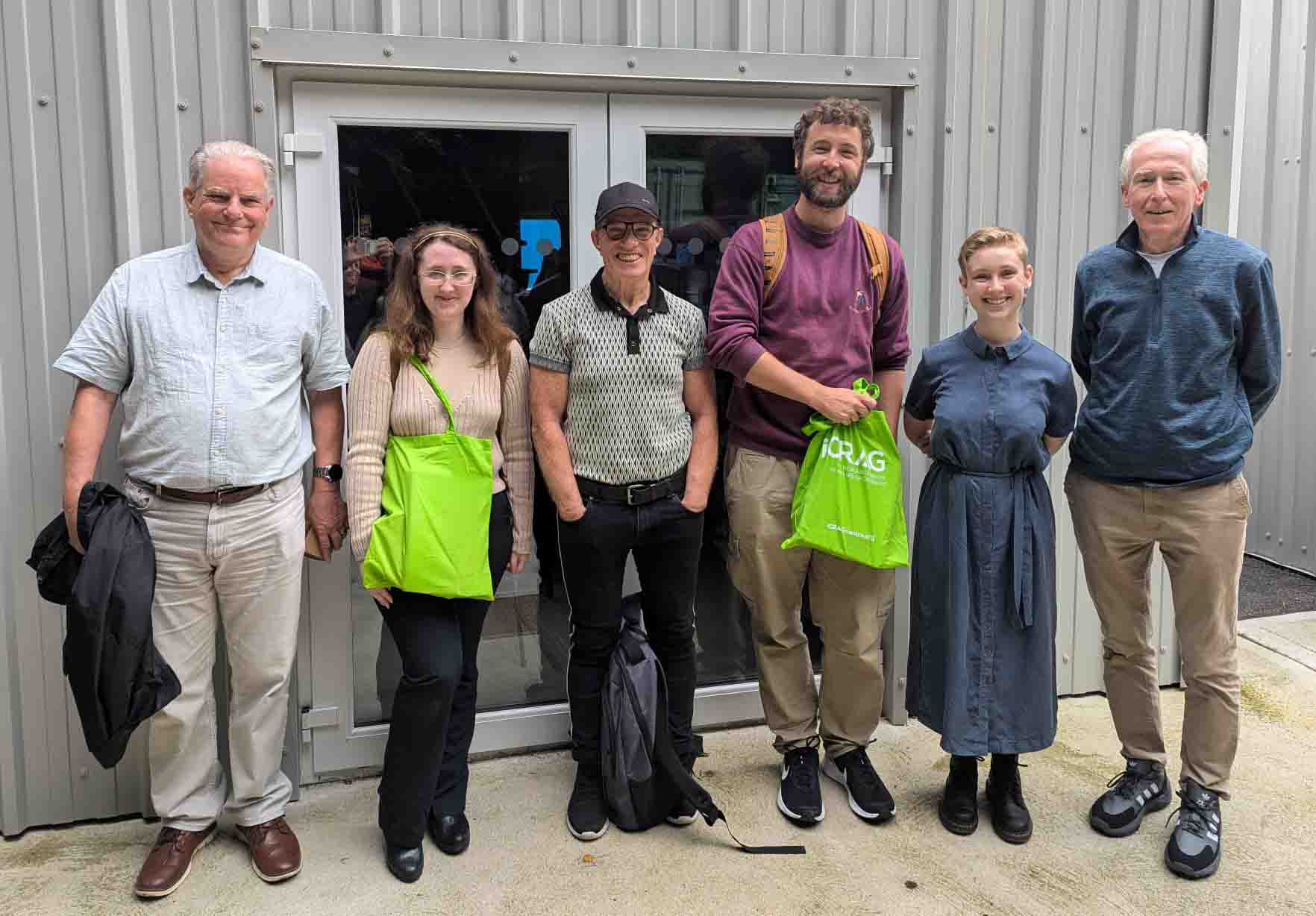
Fossils for our Future is pleased to welcome our Summer cohort to the paleontology preparation lab. Volunteers this cycle will continue work on Sydney Basin plant fossils, curating, preparing, and photographing specimens for MEG research. This cycle introduces microscopy tasks, sorting mesofossils from HF processing.
Stay tuned for updates at: Fossils for our Future
MEG hosts workshop on equity and accessibility at iCRAG Summit
June 2024
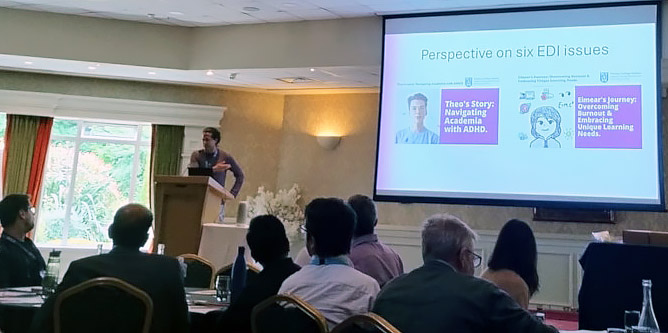
The annual iCRAG Summit in Athlone gathered geoscientists from across Ireland for two days of networking and workshops. One of MEG’s own, Marcos, had the opportunity to organize a workshop focused on equity, diversity, and inclusion. During the session, Marcos shared powerful testimonies from students with disabilities, sparking meaningful discussions on how best to support and accommodate their needs.
To learn more about the summit: https://www.icrag-centre.org
MEG presents their latest findings to the world’s fossil plant experts
May 2024
-croppedcompressed3(002).jpg)
The big names in the fossil plant sciences converged on Prague for the joint 15th International Palynological Congress and 11th International Organization of Palaeobotany Conference.
Holly-Anne presented her supercontinent-sized work on Triassic plant-insect interactions. Marcos delivered his cutting-edge findings on long-term plant trends in the wake of the end-Permian extinction event. Chris was Lead Convenor of his special symposium on the plant responses to all climate-driven extinction events.
Special thanks to the International Organization of Palaeobotany (IOP) for the travel grants awarded to Holly-Anne and Marcos! Here, Holly-Anne (far left), Marcos (far right) and MEG’s Visiting Researcher, Miriam Slodownik (centre left), are presented with their grants by the new IOP President, Prof. Harufumi Nishida (centre right).
For more on the Conference:
An evening of fossil fun to bid farewell to MEG’s first volunteer cohort
May 2024 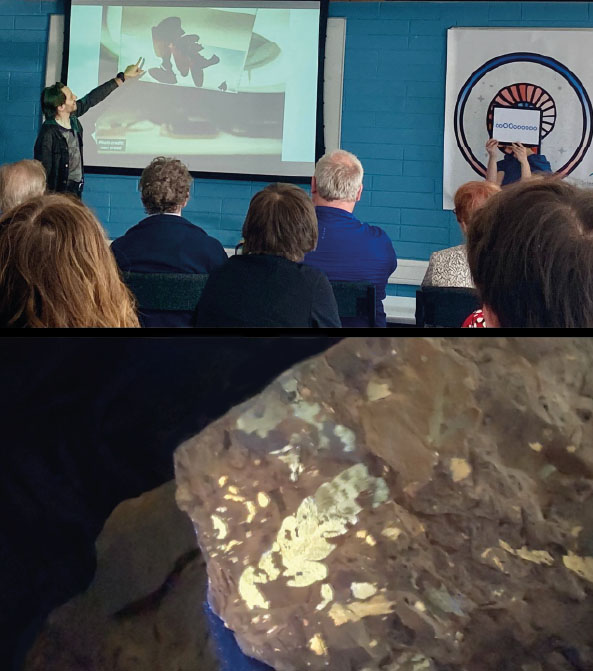
The Mass Extinction Group launched their first “Fossil Friday” event as a send-off celebration for their volunteer fossil preparators. The first cohort of the Fossils for our Future programme consisted of 33 keen volunteers. During the 15 weeks of the first session, a new lab was established, new fossil preparation protocols were written, and over 2,700 individual fossils were prepared. But, perhaps the most important outcomes were the friendships and connections made daily. MEG is proud to have brought together a new community of like-minded, palaeo-passionate people in Cork.
For more on the event:
https://x.com/palaeomays/status/1789266280928645428
https://x.com/CorkCoast/status/1789296325328277932
For more on the programme:
Fossils for our Future at the Cork Lifelong Learning Festival
April 2024
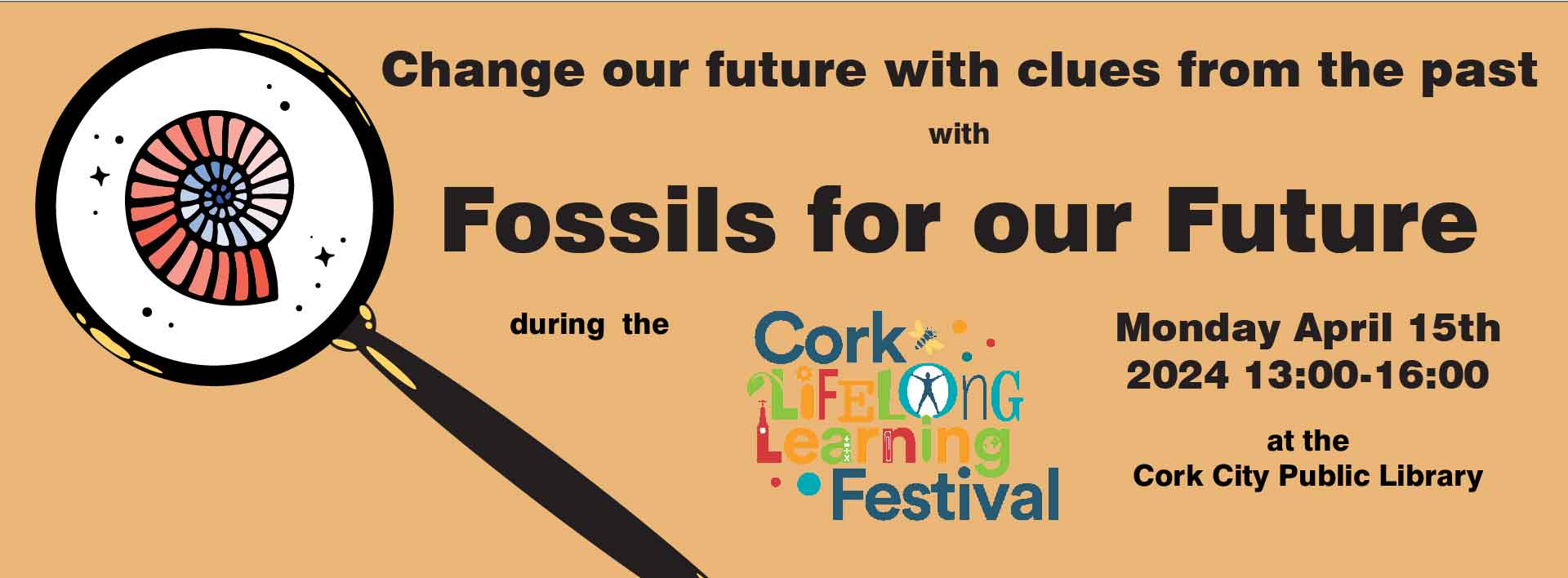
Fossils for our future is excited to be part of the Cork Lifelong Learning Festival! Come prepare fossils and learn more about this citizen science programme on Monday April 15th form 13:00-16:00 at the Cork City Public Library.
Check out this and other CLLF events at: Cork Lifelong Learning Festival
Fossils for our Future welcomes palaeontology citizen scientists
February 2024
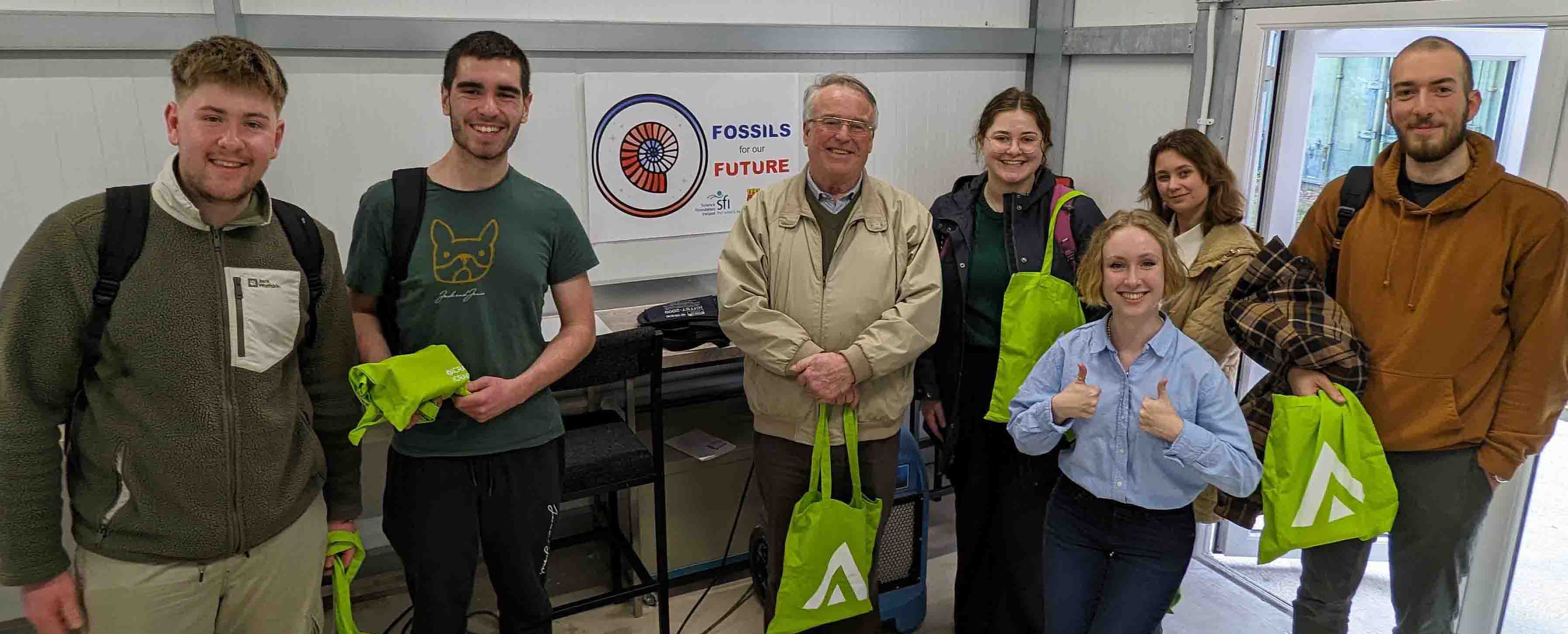
Fossils for our Future, our programme for adult citizen scientists, has opened its doors to the Spring 2024 volunteer cohort. Thirty-three volunteers, united in their passion for science, are curating, photographing, and preparing fossils for MEG research. Through their efforts, these volunteers will help MEG investigate end-Permian mass extinction event and its relevance to today’s climate crisis.
Read more at UCC News
For more programme information and to sign up, go to Fossils for our Future
Research trip to California to blast fossil & modern plants with X-rays
December 2023
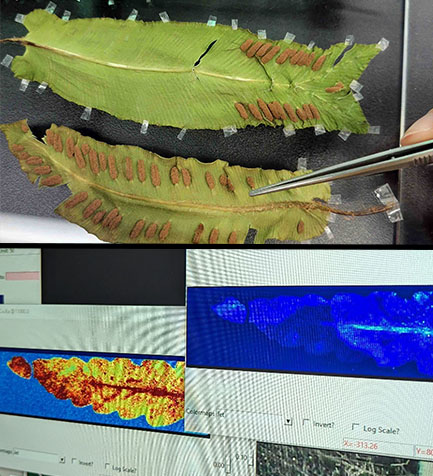
MEG members visited the Stanford Synchrotron Radiation Lightsource (SSRL) in California, USA, to analyze the heavy metal contents in modern and fossil leaves. This approach may show how plants of the deep past survived times of heavy metal contamination in the air and soils. SSRL uses bright x-rays to answer these and many other research questions. After zapping their specimens, MEG has gained some exciting data and a powerful new tool to investigate mass extinctions through time.
Dissolving fossils at the Swedish Museum of Natural History
November 2023
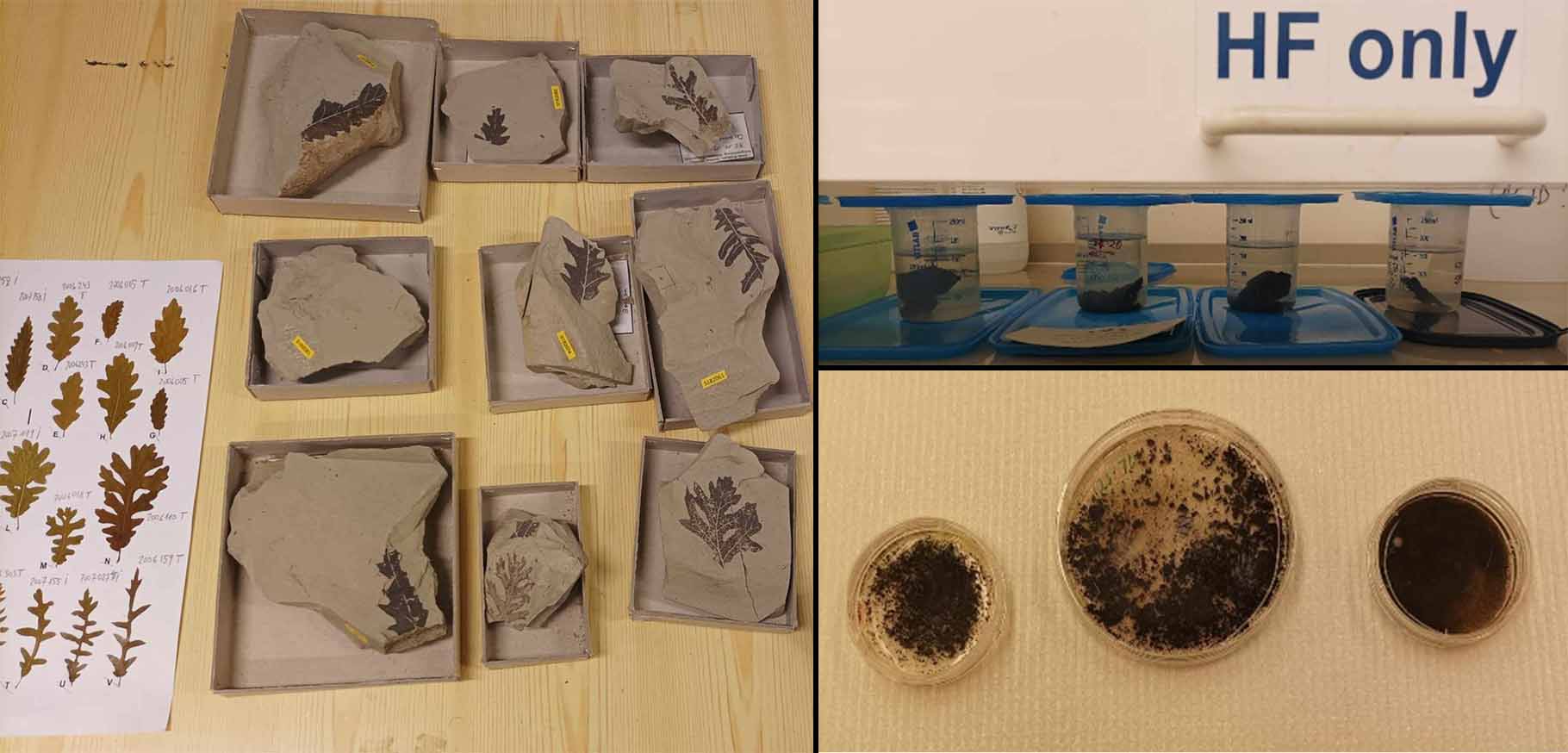
Chris and Holly-Anne visited the Swedish Museum of Natural History (NRM) in snowy Stockholm to photograph the Australian plant fossil collections housed there. Holly-Anne gathered leaf fossil images to look for evidence of plant-insect interactions, including various styles of leaf-eating and egg-laying. Holly-Anne’s Co-supervisor, Prof. Steve McLoughlin (NRM), demonstrated the use of strong hydrofluoric acid to dissolve rocks and extract the fossils inside. The Mass Extinction Group will apply this technique to the plant fossils collected from the Sydney Basin.
For more on MEG's research: Research
To learn more about Prof. McLoughlin's work: Stephen McLoughlin - Naturhistoriska riksmuseet (nrm.se)
Chemical fingerprinting of fossil-rich rock samples at UConn, USA
November 2023
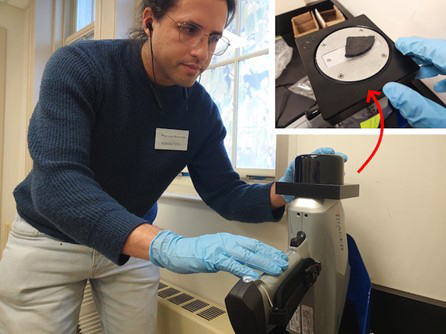
Marcos visited the University of Connecticut (UConn) in the USA to analyse hundreds of rock samples from the Sydney Basin using X-rays. This technique provides a unique “chemical fingerprint” for each rock, offering insights into the climate conditions present at the time when the rocks—and the fossils they contained—formed.
For more information on the facility, see: https://earthsciences.uconn.edu/
New Sydney Basin findings presented at the Palaeontological Association conference, Cambridge, UK
September 2023
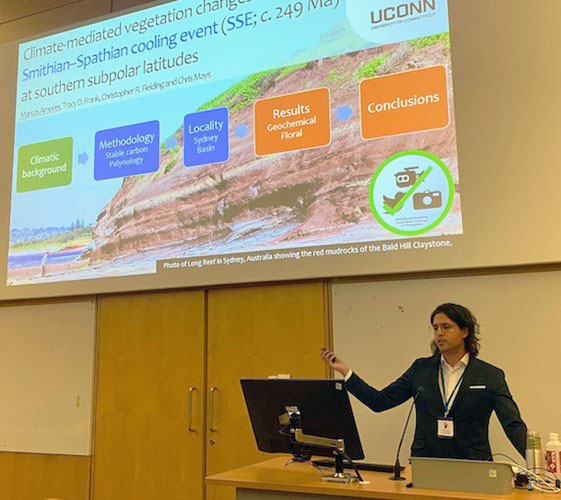
At this year’s annual meeting of the Palaeontological Association in Cambridge, UK, one of our MEG members had the opportunity to present his groundbreaking research findings. Marcos shared new Early Triassic plant and geochemical discoveries, shedding light on a period in Earth's history when temperatures were up to 12°C higher than today.
For more on the conference: https://www.palass.org/
Field work investigating the end-Permian extinction and Triassic recovery in the Sydney Basin
August 2023
![Holly-Anne and Chris in the field. Photo Credit: H-A. Turner [Left],C. Mays [Right] Holly-Anne and Chris in the field. Photo Credit: H-A. Turner [Left],C. Mays [Right]](/en/media/research/massextinctiongroup/hatfield.jpg)
Chris and Holly-Anne, together with Profs Steve McLoughlin (Swedish Museum of Natural History) and Christopher Fielding (University of Connecticut), revisited the Sydney Basin for a data collection trip. They collected post-extinction plant fossils in the field and photographed the Triassic collections at the Australian Museum and the Londonderry Core Library. They were able to gather additional data for their research projects and loads of extra plant fossil material for the Fossils for our Future programme.
For more on MEG research: Research
Collections visited: https://australian.museum/learn/collections/ and WB Clarke Geoscience Centre - Londonderry core library
To learn more about Prof. McLoughlin’s work: https://www.researchgate.net/profile/Stephen-Mcloughlin-4
To learn more about Prof. Fielding’s work: https://www.researchgate.net/profile/Christopher-Fielding-2
Holly-Anne’s publication outlines leaf arrangement in a 407 million-year-old fossil plant
June 2023
![Holly-Anne reconstructing a Devonian club moss. Photo Credits: Luisa-Marie Dickenmann [left] and Dr. Sandy Hertherington [right] Holly-Anne reconstructing a Devonian club moss. Photo Credits: Luisa-Marie Dickenmann [left] and Dr. Sandy Hertherington [right]](/en/media/research/massextinctiongroup/HATpub.jpg)
Before beginning her PhD with MEG, Holly-Anne was investigating the leaf arrangement of one of the earliest land plants as part of the Molecular Palaeobotany and Evolution Group at the University of Edinburgh. As primary author of this paper, she digitally reconstructed fossilised stems of an Early Devonian club moss. She discovered that, unlike most plants alive today, this plant organised its leaves in a type of spiral that does not follow the Fibonacci sequence, challenging previous assumptions about conservation of this growth pattern in plant evolution.
To read her publication: https://www.science.org/doi/10.1126/science.adg4014
To read a summary of her findings: https://theconversation.com/how-a-400-million-year-old-fossil-changes-our-understanding-of-mathematical-patterns-in-nature-207552
Cork Carnival of Science interactive fossil exhibit
June 2023
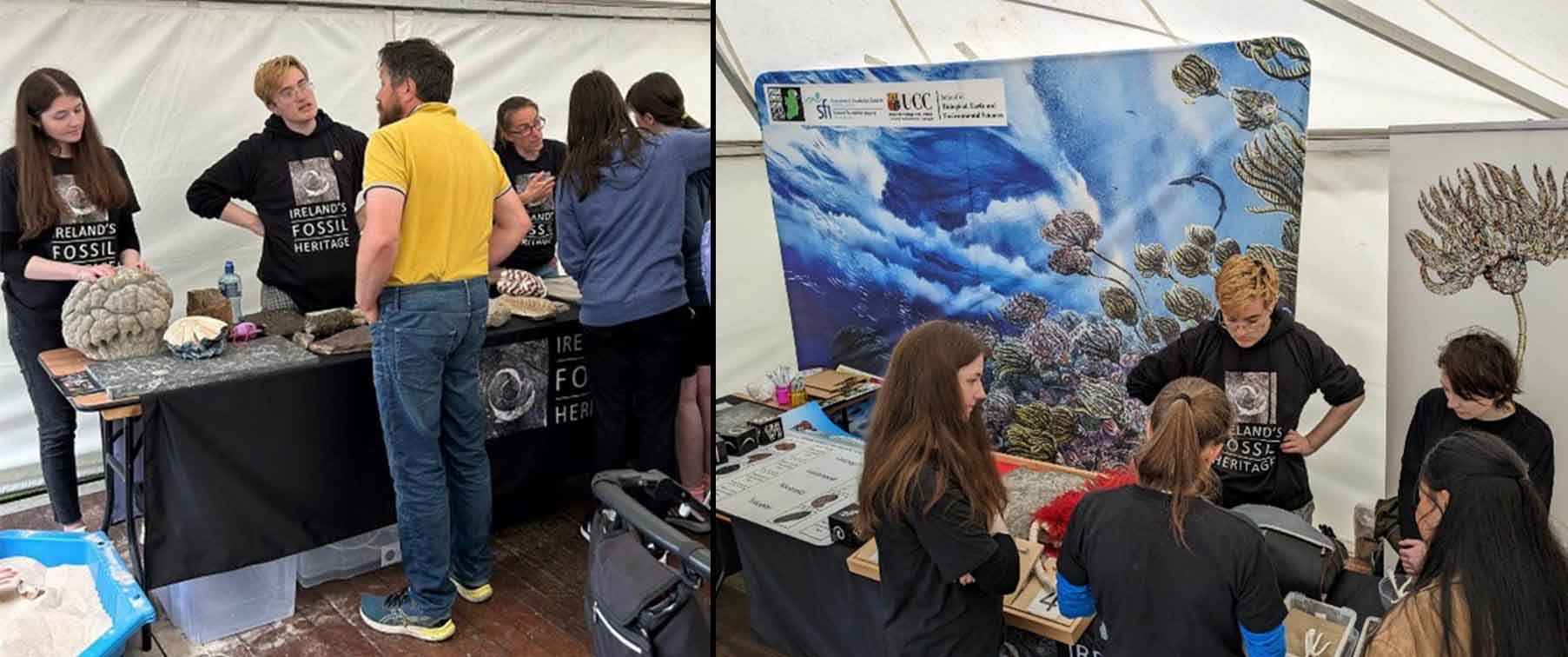
The Cork Carnival of Science is an annual festival celebrating science and learning with family-friendly events and activities for folks across southern Ireland. MEG member, Holly-Anne, and the Cork Palaeo group chatted with visitors to Ireland’s Fossil Heritage tent about fossils from Ireland and around the world and learned about fossilisation and extinction through interactive exhibits. Special thanks to Maria McNamara and her Ireland’s Fossil Heritage team!
To learn more about Ireland’s Fossil Heritage: https://www.ucc.ie/en/fossil-heritage/
To learn more about the Carnival of Science: https://www.corkcity.ie/en/cork-carnival-of-science/
Fossils for our Future at the Cork Lifelong Learning Festival 2023
February 2023
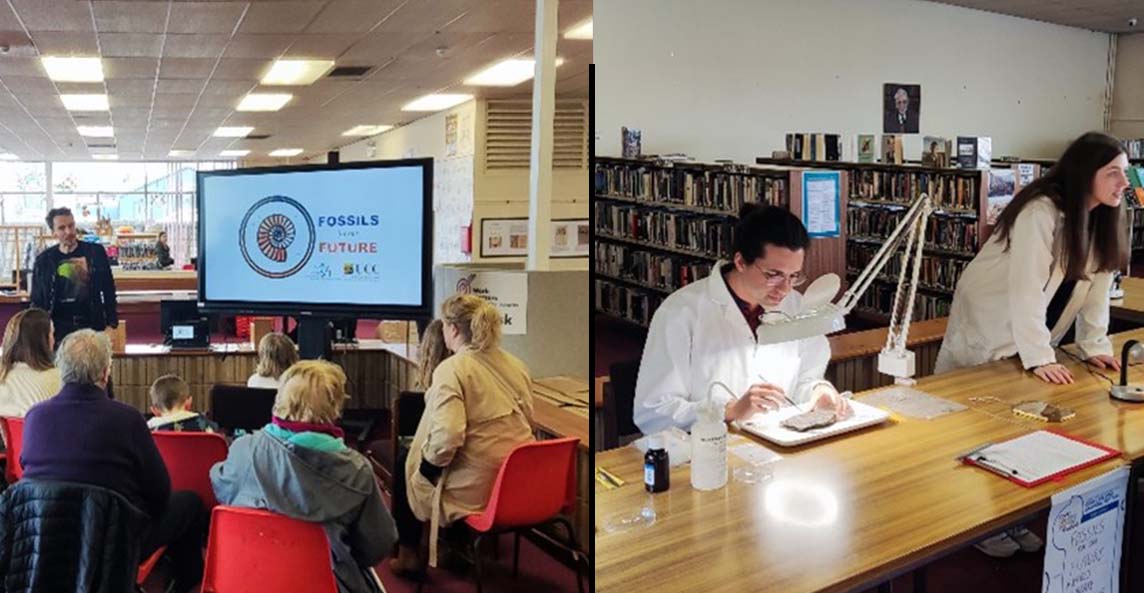
The Cork Lifelong Learning Festival is an annual celebration of learning for people of all ages, interests, and abilities. Hosted by the Frank O’Connor Library in Mayfield, Chris, Holly-Anne, and Marcos talked with visitors about the launch of the Fossils for our Future citizen science programme, where volunteers assist the Mass Extinction Group with fossil preparation and analysis. The MEG team’s palaeo passion was infectious, with several of the visitors signing up for the Fossils for our Future programme.
To learn more about Fossils for our Future: Fossils for our Future
The Mass Extinction Group on the trail of the biggest extinction of all
December 2022
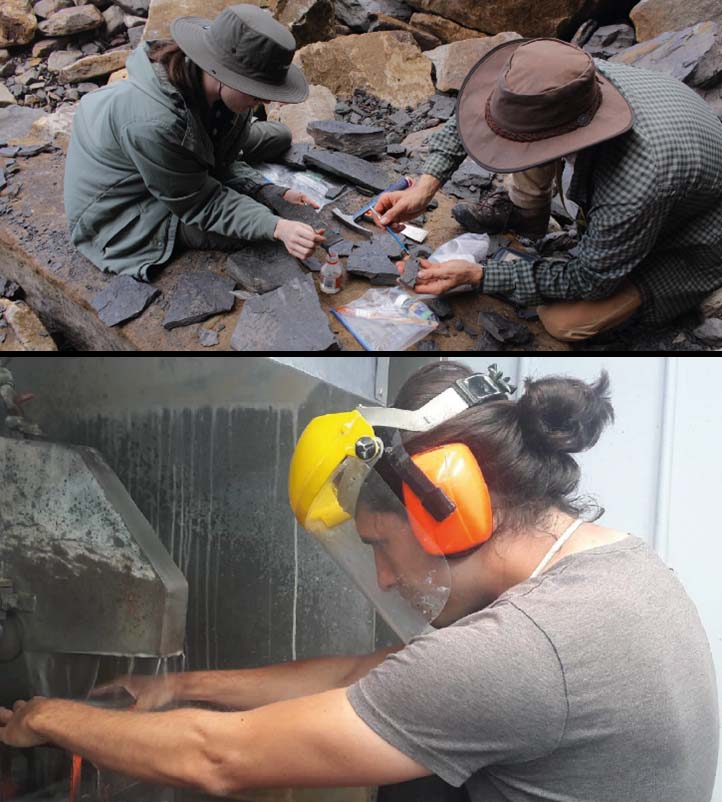
Holly-Anne, Marcos and Chris—along with other key members of the Cork Palaeo Group (Maria, Valentina and Aaron)—undertake their first field sample collection trip. They were on the trail of the worst extinction event in Earth’s history: the end-Permian event (252 million years ago). Luckily, it wasn’t hard to find. It’s exactly where you would expect to find fossils, but find none at all: a sign of bad times!
Lots of museum photography (Holly-Anne), core sampling (Marcos) and field sampling (everyone). Together, they collected enough data for everyone’s projects, and plenty of material for our Fossils for our Future volunteer preparation team.
To find out more about MEG research, visit: Research
500 million years of Earth’s climate evolution with Cork Culture Night
September 2022
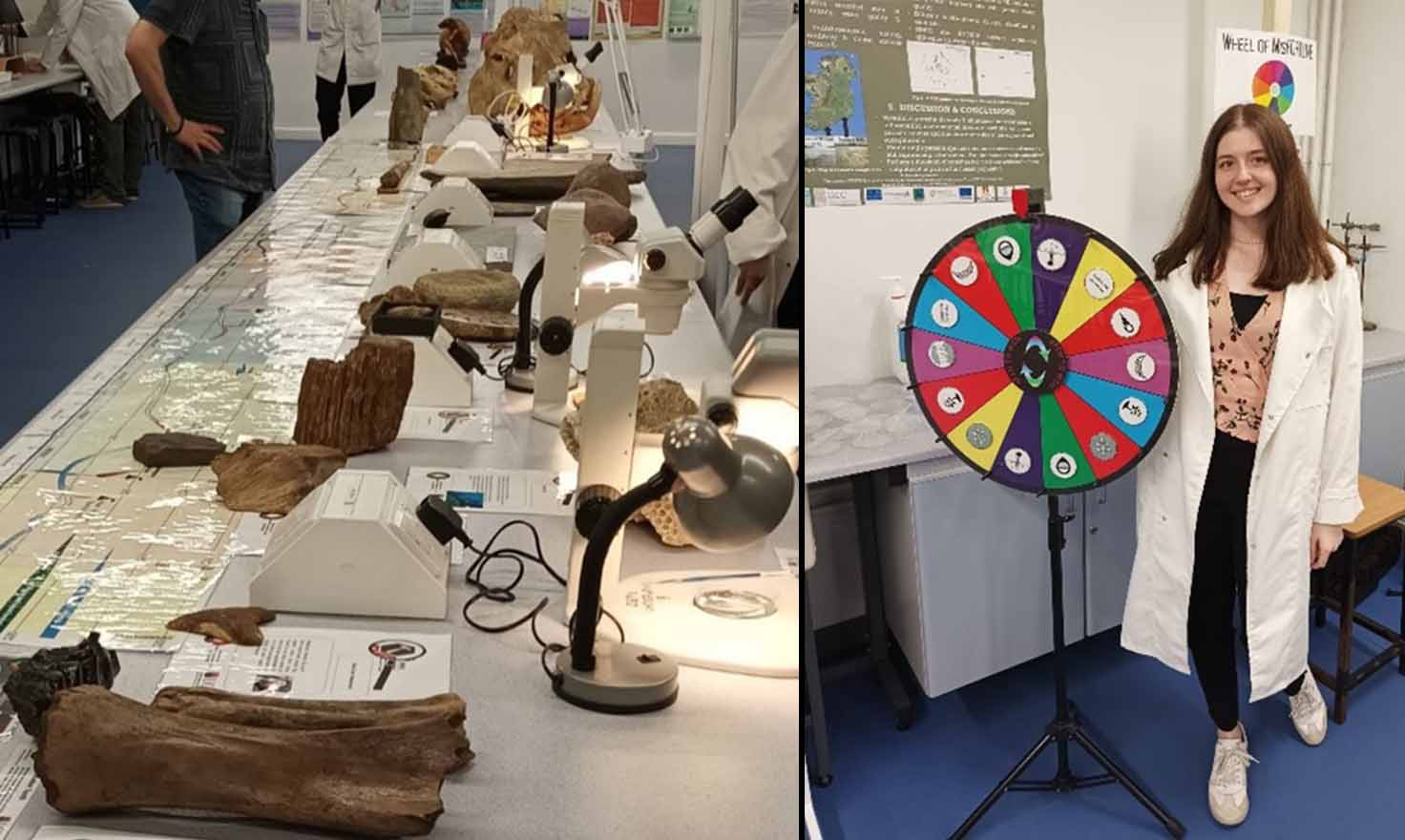
Culture Night is an annual celebration of arts and culture held across Ireland. At UCC BEES, Chris and Holly-Anne explored how fossils can tell us about past & future environment changes. The Cork Culture Night visitors witnessed 500 million years of climate evolution recorded by fossil plants and animals, discussed the importance of carbon sinks, like the peat bogs found across Ireland, and practised evading extinction by playing the Wheel of Misfortune (on loan from Ireland’s Fossil Heritage)!
Find out more at: https://twitter.com/holly_anne__/status/1573347435870654467

